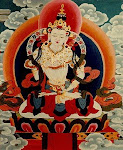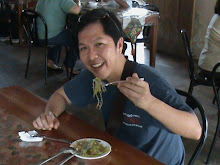
The movie Mano Po was a watershed for Philippine movies, as it seems to be the first Filipino movie done about the Chinoy experience. The movie delved on tradition, modernization, assimilation, filial obligation and individuation. And as far as I can remember, Mano Po is one of the two movies (the other being Ganito Kami Noon, Paano Kayo Ngayon) which frames the question of Pinoy identity in terms of hyphenated terms. Mano Po became immensely popular that it had spawned a franchise, the most recent incarnation of which was the hystercally unpallatable Manay Po, a slapstick comedy centering on gay Chinoys that did not uplift the gays or the Chinoys.
I was trying to be flippant about the one line review. And all the people whom I've relayed it to seemed to get a sense of the joke but were as equally confused as to what exactly I meant. Indeed, in laying down the comparison, was I referring to the first Mano Po with all its freshness? Or was I mocking The Golden Child by ascribing it to be better than Mano Po, the deteriorating franchise? When I blurted out the one-line review to Rody Vera, he burst into a series of guffaws. Ditto, Liza Magtoto and the members of the Writers Bloc. Let me explain.
At the break after act 1, people were streaming out of the Little Theatre gushing about the set, the costumes, Art Acuna’s snappy accent as Eng Tieng-Bin, and Irma Adlawan’s perfect comic timing as the bitchy first wife. A veteran director observed that general lack of stage action. And Act 2 had more of this static blocking. Characters sit and stand in the vicinity of their original place as if they had an invisible chain attached to the table or chair. It could be that the ingenious set mainly made of gauzes and screens (divided into symbolic pavilions of the three wives placed around a courtyard) demanded a less than busy stage business. But on the whole, the scenes played well.
At the end of act 2, there was an enthusiastic response, but not gushing applause, contrary to what I expected. I went to the show determined to like the play. I have been a fan of DDH ever since I saw Behn Cervantes play Gallimard in the Dulaang UP’s production of M. Butterfly; been happy for his Pulitzer nominations, too. I’ve developed a real admiration for the sharpness in which Hwang dramatizes and dissects race relations. The Golden Child is a cleverly written play. Despite character types, it avoids the pitfalls of melodrama (although one could see it peeking in the sidelines). The repartee is crisp and entertaining. When the characters talk to their dead ancestors—a running devise in the play—the philosophical tone reminds me of scenes from the Greek tragedies. The plot points are suspensefully paced. Hwang structures the scenes evenly among the wives and the excellent actresses each claimed their star turn.
But as all of these elements are building up, the play seemed to end abruptly with the monologue of Eng soon after the death of the third wife (theatrically dramatized using Peking Opera references). After that scene, the play goes back to the present where Andrew, the grandson of Eng (also played by Acuna) is suddenly illumined by the moral lesson of the past. The play’s text sufficiently opens several platforms for discussion. But lack an emotional closure worthy of Andrew’s realization. Golden Child raised the audience’s expectations but—like a banquet that did not serve steamed crabs—it left us craving for some explanation.


